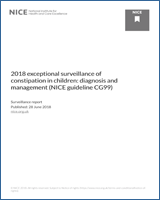NCBI Bookshelf. A service of the National Library of Medicine, National Institutes of Health.
Surveillance decision
We propose no update of the NICE guideline on constipation in children and young people.
Reasons for the decision
Assessing the evidence
The purpose of this exceptional review was to examine the effectiveness of transanal irrigation (TAI) as a management option for idiopathic constipation in children and young people. All other areas covered in the guideline scope were not considered by this exceptional review.
We decided to undertake an exceptional review of this area following the publication of NICE’s medical technologies guidance on Peristeen transanal irrigation system for managing bowel dysfunction (MTG36) in February 2018. This guidance recommends the use of Peristeen, a TAI device, in children with bowel dysfunction. Because the population of NICE guideline CG99 could be covered by MTG36, we decided to review the area again and consider the impact on NICE’s guideline on constipation in children and young people.
See Appendix A: Summary of evidence from surveillance (PDF): summary of evidence from surveillance for details of all evidence considered, and references.
Guideline development
The current guideline does not include recommendations about TAI for bowel management. This is because the evidence was previously considered to be too preliminary to inform recommendations in this area.
Views of topic experts
We considered the views of topic experts, including those who helped to develop the guideline. They were all in agreement that since the original guideline was produced in 2010, the use of TAI is becoming a more mainstream and viable option to manage idiopathic constipation when standard therapy has failed. They highlighted that a small proportion of children may be undergoing surgery (following a referral made in accordance with a current recommendation in NICE guideline CG99) when the non-surgical option of TAI may have been more appropriate. However, it is unclear to what extent this may be occurring in practice and no evidence was identified to confirm this.
Given that TAI is still a relatively invasive procedure compared to standard treatment with medication, they highlighted that it should only be considered if the child is truly treatment-resistant. They also added that TAI required careful case selection, education and support from a healthcare professional.
Impact
The current guideline does not include recommendations about TAI as a treatment option. The NICE medical technologies guidance on Peristeen transanal irrigation system for managing bowel dysfunction (MTG36) does recommend the use of Peristeen in children, however the evidence considered in this guidance was not in scope for NICE guideline CG99.
After taking into account the views of topic experts, we acknowledge that this is an area of research showing promising results for the treatment of constipation in this population. However, the findings from this exceptional review have demonstrated that the evidence on TAI has not substantially progressed since we last checked in 2017 and there is still uncertainty around the safety and efficacy of TAI in this population. For this reason, we will not update the guideline at this time.
Other clinical areas
This exceptional surveillance review did not search for new evidence relating to other clinical areas in the guideline.
Equalities
No equalities issues were identified during the surveillance process.
Overall decision
After considering all evidence and other intelligence and the impact on current recommendations, we decided that no update is necessary at this time.
See how we made the decision for further information.
How we made the decision
Exceptionally, significant new evidence may mean an update of a guideline is agreed before the next scheduled check of the need for an update. The evidence might be a single piece of evidence, an accumulation of evidence or other published NICE guidance.
For details of the process and update decisions that are available, see ensuring that published guidelines are current and accurate in developing NICE guidelines: the manual.
Evidence
This exceptional review provides an overview of evidence relating to the use of TAI in children with idiopathic constipation published since the end of the search period for the guideline (July 2009). The results of the cumulative evidence were considered in detail alongside topic expert feedback on the intervention to determine if there is an impact on the guideline.
Views of topic experts
We engaged with topic experts who were also members of the guideline committee involved in the development of NICE guideline CG99.
Views of stakeholders
Because this was an exceptional surveillance review we did not consult on the decision.
NICE Surveillance programme project team
- Kay NolanAssociate Director
- Martin AllabyConsultant Clinical Adviser
- Emma McFarlaneTechnical Adviser
- Alice MurrayTechnical Analyst
The NICE project team would like to thank the topic experts who participated in the surveillance process.
- NICE Clinical Guideline 99: Constipation in Children and Young People: Diagnosis and Management of Idiopathic Childhood Constipation in Primary and Secondary Care
- Constipation in children and young people: Evidence Update June 2012: A summary of selected new evidence relevant to NICE clinical guideline 99 'Diagnosis and management of idiopathic childhood constipation in primary and secondary care' (2010)
- Surveillance report 2017 - Constipation in children and young people: diagnosis and management (2010) NICE guideline CG99
- 2018 exceptional surveillance of constipation in children: diagnosis and managem...2018 exceptional surveillance of constipation in children: diagnosis and management (NICE guideline CG99)
Your browsing activity is empty.
Activity recording is turned off.
See more...
